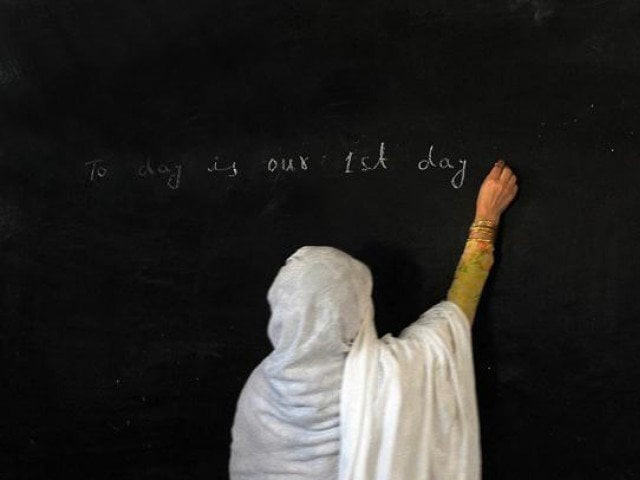CM green lights hiring 3,500 staff for NMTD schools
Directs to relax rules for recruitments and upgrading schools

Representational image. PHOTO: FILE
However, this has been instructed with directions to relax the rules for recruitment.
This was directed by the Khyber-Pakhtunkhwa (K-P) Chief Minister Mahmood Khan on Friday while chairing a high-level meeting on the progress of development portfolio in the education sector of the erstwhile federally administered tribal areas (Fata).
The chief minister expressed concern over delays in implementing developmental schemes in the newly-merged tribal districts (NMTDs).
He directed the education department to regularly conduct surprise visits of educational institutions in the tribal districts through the independent monitoring units (IMUs) to ensure the provision of quality education. Further, CM Mahmood directed the department to take steps for terminating all those teachers who provided fake documents and those who have been absent from their assigned educational institutions.
Expressing concerns over the quality of oversight officers in the tribal districts, the chief minister directed the provincial education department to appoint competent District Education Officers (DEOs) and formulate a policy for shuffling of all clerical staff who have completed at least two years of service on their current posts.
He also sought a report on the facilities available in educational institutions in these areas and the missing facilities.
The chief minister directed that all recruitments in the NMTDs should be from local communities. In this regards, he said that recruitment tests for teachers should be held in the respective districts, instead of conducting them in the provincial capital.
Curiously, Mahmood directed the education department to relax the rules for upgrading schools in the district and in hiring teachers. Furthermore, he directed that once appointed, posting and transfer requests from these teachers will not be entertained.
The Chief Minister also directed the newly elected representatives from NMDs and the education department to mutually identify cases related to schools up-gradation and establishment of new schools.
Recently-elected representatives from NMTDs expressed their views about the pace of developmental schemes in the education sector in their respective constituencies and also expressed satisfaction over the participative approach of the government towards ensuring good governance.
Officials told participants of the meeting that developmental schemes had been handed over to the provincial government during the ongoing fiscal year and substantial progress had been achieved in the Annual Development Programme (ADP) projects, including the programmes listed under the Accelerated Implementation Plan (AIP) and the Quick Impact Projects (QIP).
In this regard, Rs477.56 million has been allocated for some 139 ADP projects of which Rs154.63 million has been utilised. Moreover, Rs7.686 billion has been allocated for 18 developmental projects under AIP.
Under AIP, education-related projects include the development of play areas in schools, provision of stationery free-of-cost, school bags, free textbooks, provision of furniture, construction of boundary walls, toilet blocks, provision of drinking water, repairing rooms, building additional classrooms, strengthening parent-teacher committees (PTCs), establishing ECE Rooms, setting up science laboratories in high and higher secondary schools, provision of teachers to primary, middle and high schools and the establishment of computer labs.
As per the practice in the settled districts, Mahmood directed to shift schemes for the provision of textbooks to the current budget from the budget of the next financial year.
The meeting was informed that Rs2.540 billion have been allocated to provide stipends and scholarships for students of primary and secondary schools of NMTDs under an AIP project. The project will benefit some 543,085 students.
Under the private sector engagements to address access, equity and quality education challenges, different developmental projects including an education voucher scheme, the foundation assisted schools and new schools programme will be implemented. Other projects to develop the state of education in ex-Fata areas under the AIP include the solarization of some 4,711 primary schools, 548 middles schools and 363 high schools.
For this project, CM Mahmood directed the education department to involve the provincial energy department.
Similarly, he directed to include in AIP projects for rapid enrolment, quality improvement, schools governance reforms project and establishment of Cadet College in North Waziristan Tribal District.
A further five projects under quick impact projects are being implemented, including the extension of IMUs to NMTDs, filling vacant positions, primary schools rehabilitation programme, providing missing facilities and equipment in 21 higher secondary schools.
The “Story Da Pakhtunkhwa” scholarship programme for position holders is also being introduced. The government has released Rs3.87 million against total allocation of Rs15.49 million for the programme.
Published in The Express Tribune, December 28th, 2019.













COMMENTS
Comments are moderated and generally will be posted if they are on-topic and not abusive.
For more information, please see our Comments FAQ